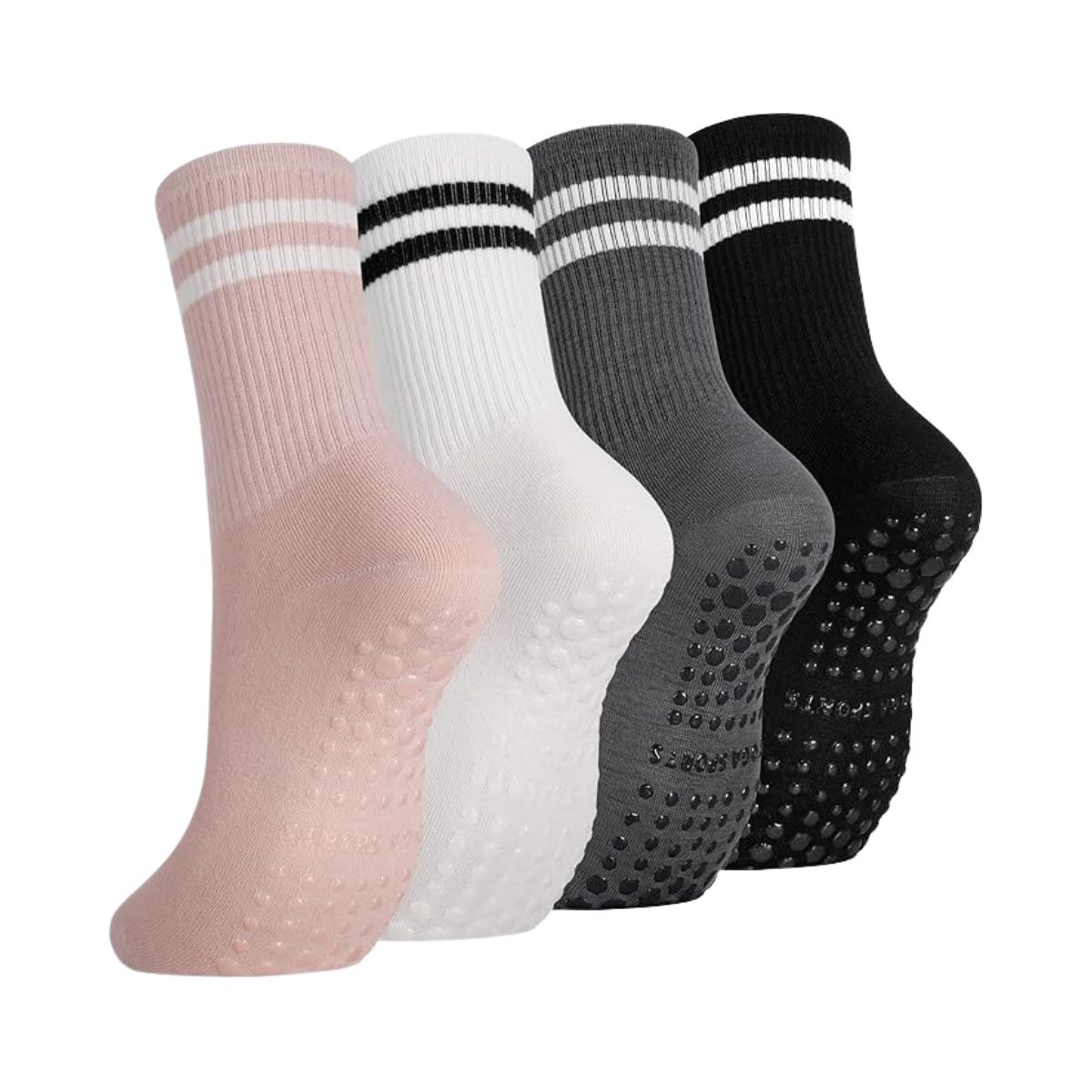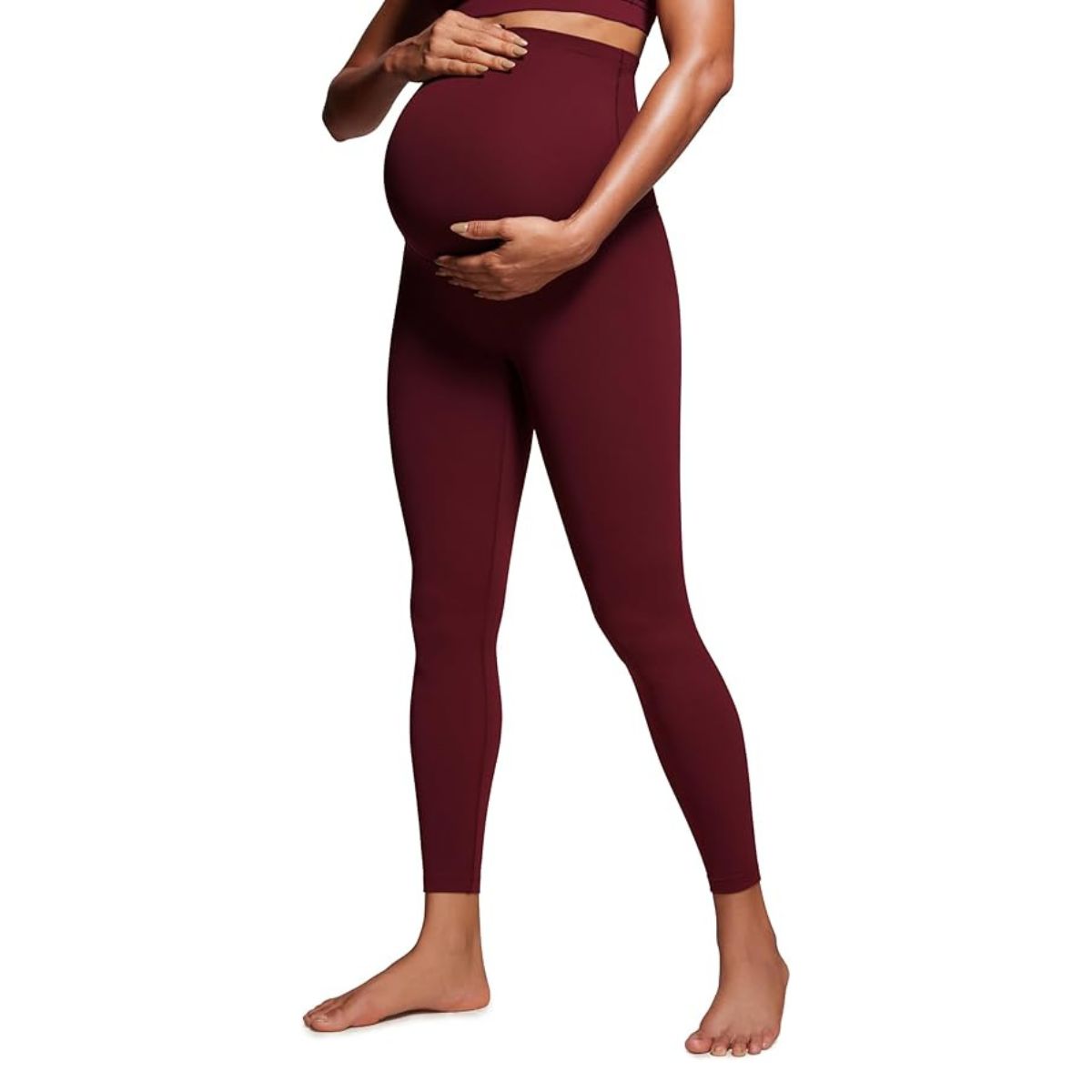I Wasn’t Sure If I Could Do Reformer Pilates While Pregnant - but After Getting the All Clear, I'm Loving It
Heads up: it's not just a "gentler" take on the OG reformer Pilates we know and love.

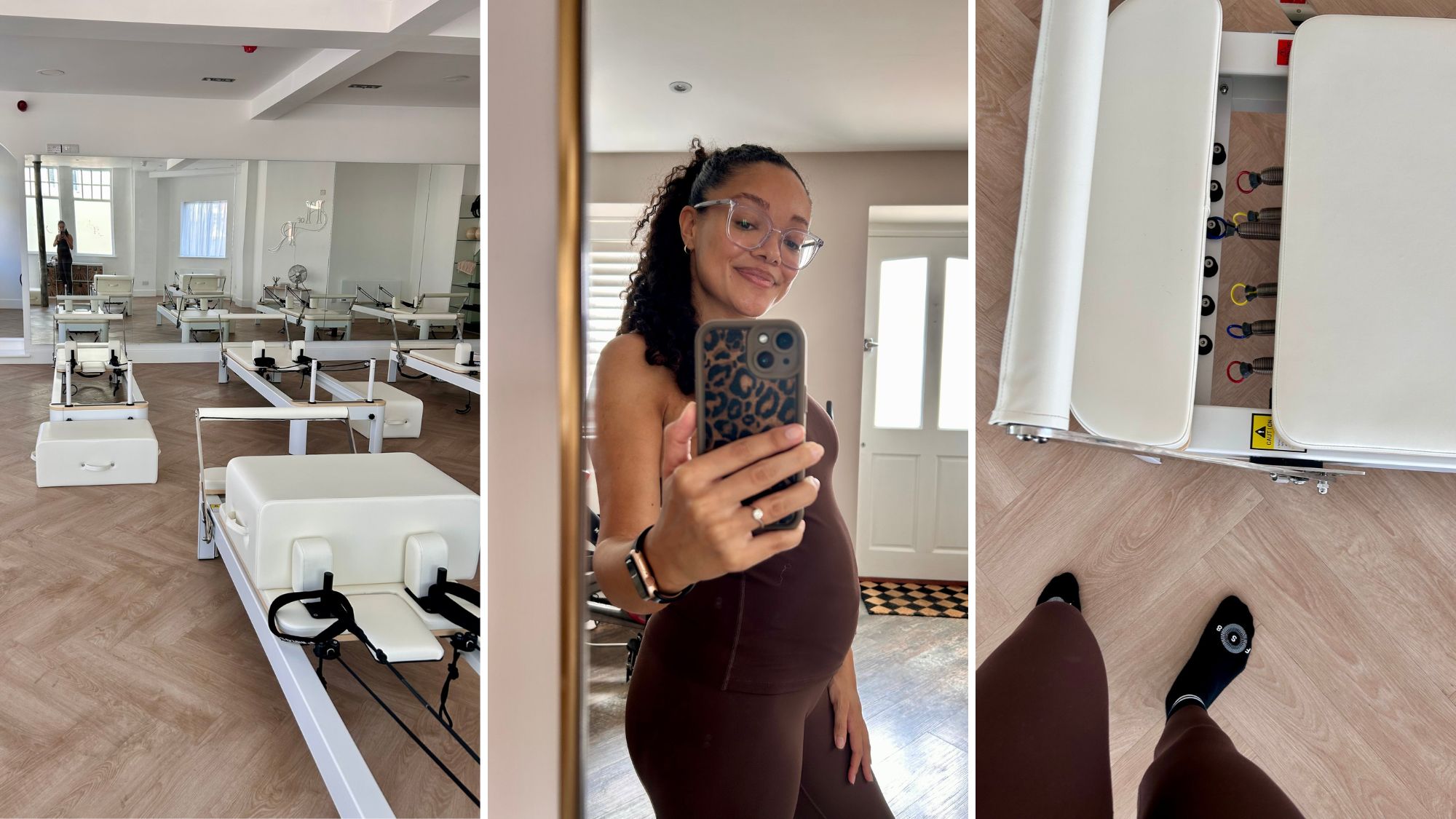
Pregnancy throws you a lot of curveballs (perhaps the biggest understatement of the century!). From switching up your skincare (bye-bye, retinol) and limiting your caffeine intake to the fluctuating mind-achingly bouts of tiredness you might experience during the first and third trimesters (hello daytime naps). Growing a baby can also take its toll on your exercise routine. Which, as a long-time lover of low-impact exercise, is why I wanted to know if it is safe to do Reformer Pilates while pregnant.
“Moderate intensity exercise is beneficial during pregnancy,” confirms Ian Scudamore, consultant obstetrician and vice president of the Royal College of Obstetricians and Gynaecologists. “If you regularly exercised prior to pregnancy, so long as it feels comfortable, keep going!". According to Scudamore, maintaining the level of physical activity that is usual for you can help your body "adapt to the changes" brought on by pregnancy. But does Reformer Pilates fall into this bracket?
After scrutinising the NHS's advice on exercising in pregnancy, speaking to certified antenatal and postnatal Reformer Pilates experts and getting the all clear from my midwife and GP, they all came back with the same response. That being - yes, it is safe to do Reformer Pilates while pregnant - but this comes with a few caveats.
"You may avoid certain positions, like lying flat on your back after the first trimester," pre and postnatal fitness trainer Hollie Grant explains, who is the founder of The Bump Plan and owner of The Pilates PT Studio. Grant notes that it's best to swerve exercises that increase intra-abdominal pressure too much, while focusing on breath-led movement, spinal mobility, glute and core strength, and functional movement patterns that actually support pregnancy, birth, and recovery. "A general Reformer class won’t always consider these things," Grant says. "Which is why specialist guidance is so important."
So, if you're up for doing a prenatal Reformer Pilates class while pregnant, it's also highly advisable to double-check that the instructor is qualified in pre- and postnatal exercise. You should also discuss any concerns with your GP or midwife, who can offer personalised advice.
Keen to find out more? Me too. So, to find out what the science-backed benefits are of doing Reformer Pilates while pregnant, uncover what the current movement guidelines say around exercise during pregnancy, and the low-down on doing Reformer Pilates while growing a baby, keep reading.
While you’re here, don’t miss our guides to the best online pregnancy workouts, the best maternity workout clothes and what happened when one writer tried out pregnancy Pilates. Or, if you’re looking for safe pregnancy workouts, find out the moves an expert would recommend.
Celebrity news, beauty, fashion advice, and fascinating features, delivered straight to your inbox!
I wasn't sure if I could do Reformer Pilates while pregnant - but have loved boosting both body and mind for me (and my little one)
But first, what is pregnancy Reformer Pilates?
To sum it up in a sentence: pregnancy Reformer Pilates is similar to the type of Reformer Pilates that’s forever trending all over your social media pages. However, the prenatal low-impact strength training session is specifically adapted to suit the needs of a pregnant body.
“In a prenatal Reformer class, you would be focusing on supporting the body during pregnancy and in preparation for birth and postnatal recovery,” explains Grace Lillywhite founder of Centred Mums. “There are the usual adaptations, such as ensuring you don’t lie on your back for too long due to the risk of Supine Hypotensive Syndrome (this only starts to be relevant after 16 weeks) and not lying on your front because of your bump. But also supporting the postural changes that many pregnant people go through, preparing for birth and trying to set the body up for a smooth postnatal recovery.”
Lillywhite says a prenatal Reformer Pilates class might also focus on including pelvic floor health, coordinating the breath with movement, releasing tension in the pelvis, the ribcage, the abdominals and glute exercises to help support the pelvic floor while strengthening the upper body in preparation for looking after a baby.
Prenatal Reformer Pilates can often be described as a "gentler" version of a regular reformer class. But as Grant reiterates, this isn't the case: "Nor does it need to be," she says.
"Movements are adapted to support your changing centre of gravity, joint mobility (thanks to hormones like relaxin), and pelvic floor," Grant says. "Pregnancy brings significant physical and physiological changes, and those need to be accounted for."
"In the right hands, Reformer Pilates can be a brilliant, low-impact, fun way to move your body throughout pregnancy," she adds.
What are the benefits of doing Reformer Pilates while pregnant?
Just like the benefits of Pilates, the pros of doing prenatal Reformer Pilates are seemingly never-ending.
According to Lillywhite, pros include:
- Increased body awareness, wellbeing, and self-confidence
- Social connection and a chance to meet other mums-to-be
- Improved breathing, abdominal support, and core stability
- Improved strength and posture for pregnancy, labour, and life with a baby
- Boost in relaxation, mindfulness, and calm
- May reduce stress, fatigue, anxiety, and insomnia
- Enhancement of circulation, blood flow, drainage, and overall fitness
- Supports safe, functional movement in daily life
- Education on pelvic floor health to aid labour and recovery
- Addresses muscular imbalances and pelvic instability
- Helps prevent or manage conditions like pelvic girdle pain, carpal tunnel, Diastasis Recti, gestational diabetes and high blood pressure.
Plus, numerous studies point to the beneficial effects of exercising while pregnant for both the mother and the baby’s health.
One 2021 study published in the journal BMC Pregnancy and Childbirth concluded that prenatal Pilates "significantly reduces" labour pain intensity, length of the active phase and second stage of labour and increases maternal satisfaction with the labour process
Another more recent study, published in 2025, found that Pilates is effective for "improving sleep quality, pain, depression, and other maternal health outcomes during pregnancy".
While a research article found that prenatal Pilates can improve the quality of life of pregnant women by reducing lumbopelvic pain, boosting mental health, and this low-impact exercise can lead to an improvement in pregnant women’s perception of their own health.
What's more, one of the latest studies, published in the women's health journal Acta Obstetricia et Gynecologica Scandinavica concluded that incorporating strength training into general exercise recommendations for pregnant women has the "potential to optimize maternal health outcomes" including muscle strength, weight gain, physical activity levels, low back pain, pelvic pain, fatigue, anxiety, energy levels, vitality and sleep duration. Which is just another massive tick in the books, considering reformer Pilates is a type of strength training.
Are there any risks to trying Reformer Pilates while pregnant?
If you're not properly instructed, any form of exercise carries its risks - and prenatal Reformer Pilates is no different.
“Things like lying flat on your back after the first trimester for too long, unsupported single-leg work that might be too much for a changing pelvic floor, or loaded abdominal exercises can increase your risk of issues like pelvic girdle pain or diastasis recti,” Grant highlights.
Which is why, Helen O'Leary, physiotherapist at Complete Pilates says: “The biggest risk is going to a studio, or an instructor who doesn’t fully understand or have appropriate training."
So, if you intend to do prenatal reformer, Grant recommends working with a qualified pre- and postnatal instructor. "Ideally, in a small group or 1:1 setting," she adds.
Who should I consult if I'm not sure?
If you're unsure whether prenatal reformer is right for you, it's best to speak to your midwife or GP - especially if you are new to exercise or have any complications.
"But beyond that, speak directly with the instructor," recommends Grant. "Ask what pre- and postnatal qualifications they have, and what modifications they offer. A good instructor will give you specific, trimester-appropriate support - not just say, 'take it easy' or 'avoid that'."
What I learned after doing Reformer Pilates while pregnant
Perhaps the first thing to note about prenatal Reformer Pilates is that, on the surface, it may look and feel a lot similar to your general Reformer class. For example, you’ll still use the same principles that the much-loved mat Pilates method swears by - like, matching your breath to your movements, and focusing on small, repetitive movements which are designed to be precise and controlled - all of which will challenge muscles you didn't realise it was possible to ache from.
However, the main difference I found during a prenatal Reformer class is that you probably won’t lie on your back for a long time (if at all). According to the NHS guidance, those who are pregnant should avoid lying on their back for longer than a few minutes (particularly after 16 weeks). "This is because the weight of your bump presses on the main blood vessel bringing blood back to your heart, which could cause low blood pressure and make you feel dizzy," the advice says.
The same can be said for avoiding exercises that increase intra-abdominal pressure too much. "This will be different for everyone, so the load on the springs should be modified for each individual, and the instructor should ensure that everyone is working at the right level for their body," flags Lillywhite.
Instead, prenatal Reformer focused on spinal mobility (hello, a more supple spine), glute and core strength and functional movements that will boost your balance to help you throughout bump, birth and beyond.
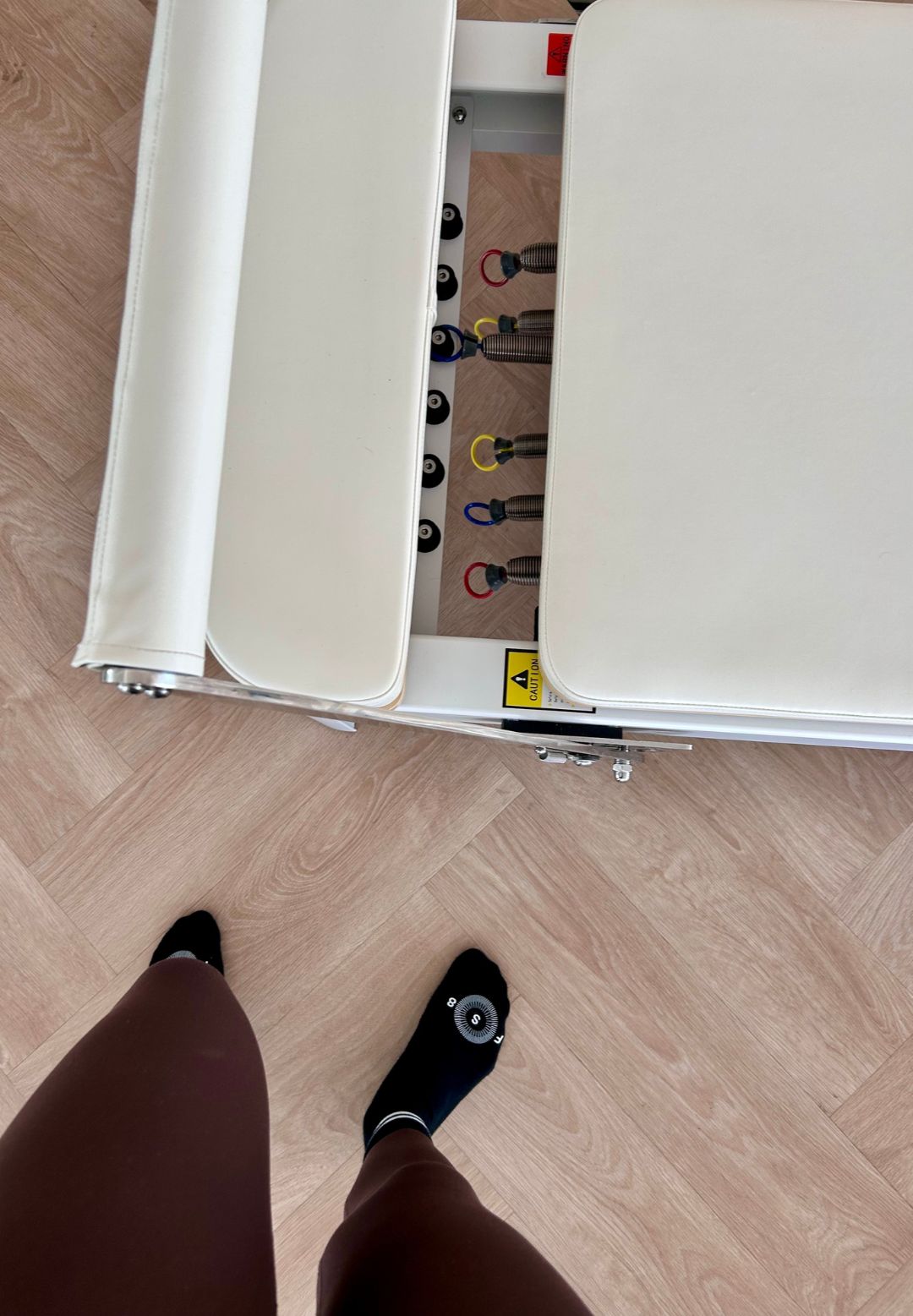
"An escape for my mind and body"
But that said, you'll still go away feeling like you've had a full-body workout and stretch! In my case, this was all thanks to the inclusion of weighted kickbacks, leg pulses, lunges, arm circles and more while trying to get to grips with my changing body and new centre of gravity.
Classes may also be smaller than you're perhaps used to - in my session, classes were capped at eight, which made the experience feel intimate yet informative as the instructor was able to keep eyes and ears on all of us and answer any questions or queries we had.
Another bonus? You get to meet like-minded people who are in the same boat, as they're also pregnant and going through the mental and physical changes that carrying a little one can bring.
But for all its differences, prenatal Reformer Pilates still resulted in a familiar outcome for me. That being that, this low-impact form of movement helped carve out 50 minutes of total meditation for my mind (as your breathing and form is the only thing you have to think about) and boost my total body strength from the inside out. So, Reformer Pilates while pregnant? It's a 10/10 from me!
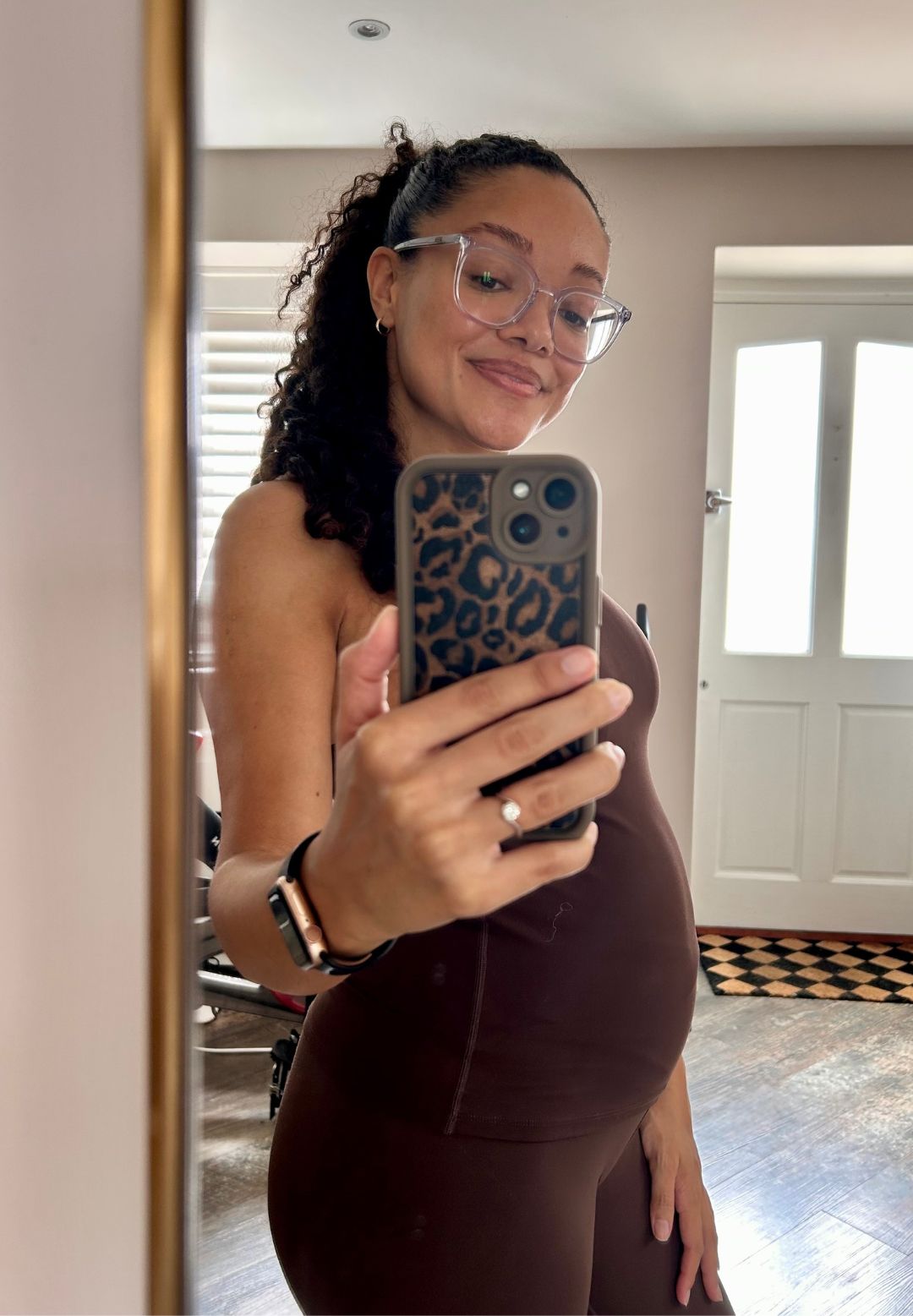
Shop MC UK's go-to prenatal Reformer Pilates kit:

If you know me, you'll know that I'm never too far away from my trusty reusable Ocean Bottle - and this is no different during pregnancy. Made with a minimum of 65% recycled materials, and better yet? Every bottle or flask the brand sells funds the equivalent removal of 1,000 ocean-bound plastic bottles, in weight.
When do I need to tell my Pilates instructor I'm pregnant?
"Ideally, as early as possible," Grant says. "Even in those early weeks, your body is already changing, and your instructor needs to know in order to adapt exercises safely. It’s not about holding you back - it’s about helping you move in a way that supports you through each stage of pregnancy."

Rebecca, or Becks, is a freelance journalist with more than ten years of experience in the industry. She specialises in all things health and lifestyle and has written for a number of brands including Women's Health, Stylist, the Evening Standard, Good Housekeeping, The Telegraph, Live Science, Tom's Guide and Fit&Well. Becks also writes copy for a number of brands and small businesses.
When she's not weight training, tracking down the best gym leggings, reading a book or at her desk typing away, you'll find her in the kitchen perfecting a new recipe or bake.
